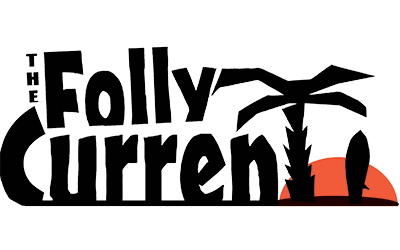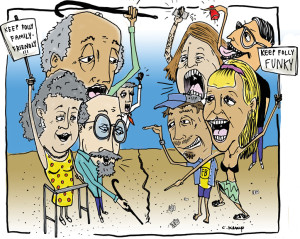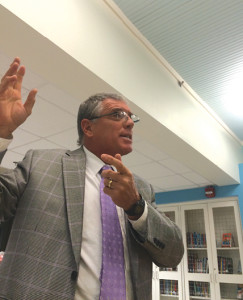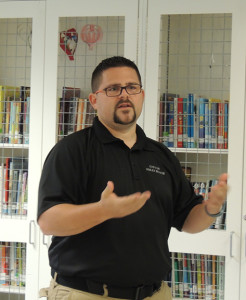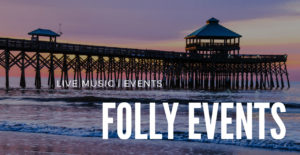The line in the sand becomes more defined As street Festival Debate Heat up
By Lorne Chambers | Editor
On a national scale there are certain issues that typically define where on the political spectrum you fall. Gun control, abortion, and gay marriage are just some of the hot-button issues that get our blood boiling and divide us ideologically. But in our little microcosm of Folly Beach, the issues that fragment us aren’t as easily categorized as those separating democrats and republicans.
Out here on the Edge of America it’s not the East Side versus the West Side (unless you’re talking about the Capture the Flag competition on May 9). No, the Folly fault line is not nearly as concrete as Center Street. Rather, it seems to be more of a symbolic line in the sand. And which side you’re on has become a hot topic as of late with City Council’s creation of a committee to help determine how and if street festivals will continue on Folly Beach.
At the March City Council meeting, Mayor Tim Goodwin tasked councilmembers Eddie Ellis, Sandra Hickman, and Pennell Clamp to look into the street festivals, talk with residents and members of the business community, and hopefully find a solution that would appease all parties involved.
There are six times a year when Public Safety blocks off Center Street and allows people to mingle and drink alcohol in the streets. Five of them are festivals and the sixth is for a brief period of time on New Year’s Eve for the Flip-Flop Drop. The City also closes the street for about 30 minutes for the Garden Club’s Easter Promenade. But primarily, it’s the five festivals (Christmas Parade, Follypalooza, Taste of Folly, Folly Gras, and Sea & Sand) that seem to have some residents questioning if they’re a truly a benefit for the island and it’s residents.
On Tuesday, April 21 the Folly Beach Civic Club hosted the first in a series of forums where club members and citizens could offer to the Festival Committee ideas and voice concerns about the street festivals. “We are having these forums to get input from the community. We want to know how the community feels about festivals, not our feelings. We’ll compile our information and present it to City Council,” said Councilman Clamp.
During the forum, Mayor Goodwin reiterated something he said back at the March City Council meeting, “the Festivals probably aren’t going anywhere.” However, for restaurant and bar owners, who benefit most from the festivals, many still recall when it seemed that the beach alcohol ban “probably” wouldn’t actually happen either … until it did. And many saw their profits plummet for a period of time in 2012 immediately following the ban.
The mere discussion of festivals and potentially banning open container in the streets, has brought some familiar foes back to the frontlines. When the beach alcohol ban was implemented three years ago there were clearly two sides facing off on the controversial ordinance. And while not everyone who supported the ban is necessarily anti-festival, or vice-versa, the battle lines have again been drawn.
On one side there are those who want to “Keep Folly Funky,” embracing a way of life that includes having a beer on the beach if they so desire or enjoying themselves at one of a handful of street festivals held on Folly every year. Their Folly Beach is a laid-back, fun-filled, quirky little island where people are free to enjoy themselves however they want, as long as no one gets hurt.
On the other side are those who want to “Keep Folly Family Friendly,” believing that shutting down Center Street, even for just five or six days a year, is problematic from a public safety and a public image standpoint. They want to preserve a way of life that is quieter, calmer, and more relaxed. Their Folly Beach is an idyllic seasisde slice of the American dream. It’s a place where someone can raise a family or retire peacefully.
It’s all about what Folly you remember said Goodwin last week, standing up and pointing to pictures on his office wall of Folly Beach throughout the years. “This is the Folly Beach I remember,” he says, pointing to a decades-old photo of a Folly that’s fairly reminiscent of today’s landscape, but also noticeably different. “I don’t remember this Folly,” he says pointing to a much older photo with cars from the 1950s.
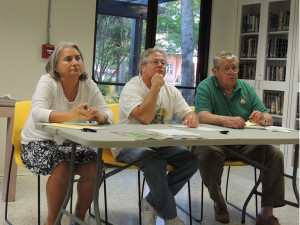
Councilmembers Sandra Hickman, Eddie Ellis, and Pennell Clamp are the Street Festival Committee tasked by the mayor to hear ideas and offer solutions.
“I think Folly Beach has changed its face and the face of its inhabitants has changed over the years,” says Goodwin. And perhaps this is part of the divide amongst some residents. But the battle over Festivals seems to transcend age, gender, and economic status. There are those who see festivals as an integral part of the fabric of Folly and those who simply see them as a roadblock (literally) to a peaceful existence.
“These festivals and fundraisers are a major part of what makes Folly so unique, special, and revered,” said Ben Bounds, owner of Follywood Productions and director of Follypalooza and the Sea & Sand Festival. “I think the amount of folks who want to do away with or cut out Center Street closures is a tiny fraction, like 5 percent or less … They just happen to be very vocal.”
Whether or not Bounds’ estimate of those who oppose festivals is accurate or not, there certainly are some residents who are vehemently against closing the streets and allowing open drinking on Folly’s main drag. One of those has undoubtedly been local attorney Keith Bolus, who says family-friendly festivals like the Christmas Parade are good for Folly but those he deems to be “alcohol-centric,” like Folly Gras, are a problem for residents and for the city.
“As residents of Folly Beach we have to endure the summer crowds. On the weekends you have tens of thousands of people coming onto the beach. Residents of Folly Beach look forward to when summer is over and things calm down,” said Bolus. “But now you have the city inviting tens of thousands of people out here in the off-season. And it’s for the benefit of a few, at the expense of many.”
The “few” Bolus is referring to is not the tens of thousands of people who come out to enjoy the festivals, but rather the handful of business owners — largely food and beverage-based — who see a major uptick in sales on the five days a year there’s a street festival. As an attorney, Bolus says his business also increases with the festivals because of the increase of accidents, arrests, and DUIs. But he would rather not have the extra business. “I realize it’s against my financial interest,” says Bolus, who sees the Festivals as much more than just a nuisance for residents. He sees them as a “catastrophe” waiting to happen. “There is no seaside community in South Carolina that I know of, that has these kind of events.”
For Lewis Dodson, co-owner of The Drop-In Deli and president of the Folly Association of Businesses (FAB), without the festivals he would probably not be able to stay in business or keep his employees paid.
“A majority of the businesses on Folly Beach are small businesses and truly struggle during the off-season. They struggle to keep their employees pockets filled and even to keep the doors open,” said Dodson. “The festivals that occur on Folly Beach are scheduled at appropriate times to combat that struggle. One festival a month during the off season gives a much needed boost to the businesses, a chance to cover bills and expenses, not only for the business itself but for its employees.”
Bolus doesn’t see this as the City’s problem. “Businesses that open up on Folly Beach know what the deal is. The dirt here is very expensive,” he said. “Why is the city getting involved in subsidizing businesses?”
Dodson says there’s a lot more at stake than just the restaurants and bars on Center Street. “There is also a greater economy that depends on Folly Beach businesses — food purveyors, merchandisers, cleaning crews, and many others,” he said. “It just seems logical that five Saturday festivals a year is a small price to pay for such a huge pay-off. It would be very selfish not think about all people who are supported by these events.”
Despite all of the people who benefit from festivals, Bolus contends they’re just plain bad business for the City of Folly Beach.
According to Chief Andrew Gilreath, director of Public Safety, each festival costs the city around $7,000-10,000 per event, just for Public Safety. And while many business owners tout the tax revenue the city gets on every dollar spent, Bolus says it’s not enough to justify the costs, and more importantly, the risks involved. He says even if there’s $100,000 in sales during the festival, that the City gets 2 percent of that, which would only amount to around $2,000, a far cry from the $7,000-10,000 the city is spending to put it on.
However, Bolus says the larger cost for the city is it’s opening itself up for being liable if something really bad were to happen.
Where Bolus and others sees the City condoning alcohol consumption in the streets as problematic, Mayor Goodwin sees the problem less to do with allowing alcohol in the streets and more to do with a handful of people being irresponsible. “If people would just behave it would keep everyone happy … to a point,” he said.
Chief Gilreathe echoed the mayor’s sentiment. “At some point, ‘open container is OK’ has become synonymous with ‘being public drunkenness is OK.’ They are not the same,” said Gilreath. “Open container is simply allowing responsible adults to enjoy a drink within reason while enjoying time with their friends and good music. It does not mean get as drunk as you can as fast as you can and then stumble around a closed street. At the end of the day, the responsibility falls upon each person partaking to control themselves and their friends they are with.” And if they don’t, Gilreath and his staff are tasked with writing citations and making arrests. He said that during an average festival that there are around 20 citations and/or arrests made.
“A few drunks spoil it for everyone else,” said Councilwoman Sandra Hickman, who added that perhaps that changes the festival times to end earlier might help. She also says making bars issue ID bracelets would be helpful.
“We recently rekindled the (ID bracelet) idea prior to Sea and Sand but logistically were not able to work out the details prior to the festival,” said Gilreath. “The result is that bars, restaurants, and public safety can easily recognize someone who is legally able to drink. If someone is becoming too intoxicated to control themselves, the officers could confiscate the bracelet.”
A day after the Civic Club forum, Councilwoman Hickman seemed to feel the weight of responsibility of being one of only three on a committee that will likely guide the future of street festivals on Folly Beach.
“Being on the committee is rough because you want to make everyone happy, which will never happen,” said Hickman. “We are still taking suggestions from anyone. There will be a Townhall meeting hopefully in June.” She encouraged people to come to that meeting and bring suggestions … not complaints.
